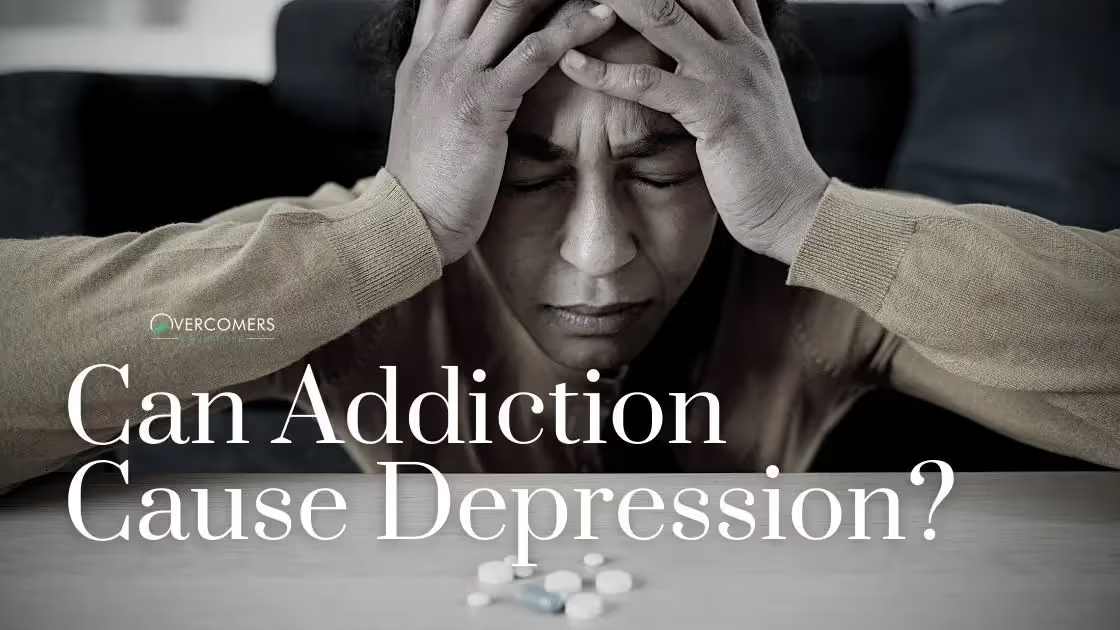Can addiction cause depression? That's a great question. You might have trouble distinguishing the symptoms of addiction from the symptoms of...

Can addiction cause depression?
That's a great question.
You might have trouble distinguishing the symptoms of addiction from the symptoms of depression.
But, don't worry.
There are many links between addiction and depression.
People with depression are more likely to become addicts.
And, addicts frequently start exhibiting the symptoms of depression.
Despite these overlaps and similarities, depression and addiction are very different.
Understanding the difference is the first step toward getting help.
Addiction is a dependency on a substance, a thing, or an activity.
We most typically think of addiction as alcohol or drug dependence.
But, people can be addicted to a lot of things.
That's because addiction is caused in the brain.
When you do certain activities, your brain releases the chemical dopamine.
Activities like meditation, eating a delicious meal, driving with the windows down.
These activities activate the pleasure signals in your brain which causes your brain to release the chemical dopamine.
Dopamine is connected to pleasure, mood regulation, and the ability to focus.
When a person takes drugs or gets drunk, their brain produces a large amount of dopamine. This is what causes people to feel euphoric or "high."
The brain doesn't make distinctions between dopamine released because of activities.
That means that getting drunk or taking opioids, having great sex, and meditating all produce the same chemicals in the brain.
That means that you can get addicted to anything that produces dopamine.

Depression is the persistent feelings of sadness, hopelessness, and despair.
Depression, particularly severe or chronic depression, can interfere with your life.
People who are depressed feel less motivated, often have trouble focusing, and don't enjoy things as much as they used to.

One of the reasons that many people confuse addiction with depression is that they have many symptoms in common.
Both addiction and depression can cause a person to refuse to acknowledge that there is a problem.
They will often be in denial about their condition and refuse to admit that they have a problem.
This is often due to the stigma that is frequently attached to addiction and depression.
People who have an addiction and people who have depression also frequently give up social activities or hobbies.
This can be because both addiction and depression affect the part of your brain that manages focus and motivation.
Both these conditions will cause you to lose interest in the things that you normally enjoy.
Both addiction and depression can cause a person to isolate themselves from other people and to experience issues in their personal relationships.
Addiction can be disruptive because of shame, lying, and theft.
Depression can hurt relationships because it causes us to self-isolate.
Both addiction and depression keep us away from the things that we love.
Depression can cause addiction.
People who are depressed typically feel low and have trouble experiencing happiness.
This might cause them to seek out pleasure in alcohol or drugs.
Many people report using alcohol or drugs to treat anxiety.
Something that starts out feeling that it's helping you could trigger an addiction.
Addiction can cause depression as you see your life slipping away from you.
Addiction often creates a barrier between us and the people we care about and the things that we love.
This can cause us to spiral into depression.
Addiction can also cause depression because of the stigma attached.
A person might lose a job or the respect of their family because of addiction.
This can lead to a spiral of self-blame and shame that feeds into your addiction.
The best way to differentiate between addiction and depression is to speak to a professional.
They'll be more capable of understanding if you're struggling with one or both.
Neither addiction nor depression will go away on its own.
This means that seeking treatment is your best chance of feeling better.
Alcoholism refers to a disease that is characterized by a strong craving for alcohol and an inability to control one's drinking.
Treatment for alcohol abuse often includes counseling, support groups, and medication. With the right help, your spouse can recover from alcoholism and go on to lead a healthy and happy life.
Some resources for family members of addicts include therapy, counseling, 12-step programs, and other support groups. It is important to seek out these resources to get the tools you need to deal with your loved one's addiction. You can also find help for yourself through these resources.
The best way to help an addict without enabling them is by setting boundaries and getting help for yourself. It is important to remember that you cannot control the addict's behavior, but you can offer support and understanding. With time and patience, you can help your loved one recover from addiction.
If you think you might be struggling with alcohol abuse, the first step is to talk to your doctor. Your doctor can help you assess your drinking habits and recommend treatment options. There are also many different types of treatment programs available for alcohol abuse, so you can find one that fits your needs and circumstances. Additionally, support groups can be a valuable resource for anyone struggling with alcohol abuse. These groups provide a safe space to share your experiences and connect with others who are facing similar challenges.
Alcohol abuse is a pattern of drinking that leads to problems in one's personal, professional, or social life.